 W
WHemwati Nandan Bahuguna was an Indian National Congress leader and former Chief Minister of Uttar Pradesh; he later joined Bharatiya Lok Dal and worked with Charan Singh.
 W
WSachindra Chaudhuri was an Indian lawyer and politician who was Minister of Finance of the Government of India from 1965 to 13 March 1967, under Lal Bahadur Shastri and Indira Gandhi. He also was Director of several companies, member of Central Board of State Bank of India, member of Law Commission and member of Indian delegation to General Assembly of the United Nations.
 W
WShankarrao Bhavrao Chavan was an Indian politician who served twice as Chief Minister of Maharashtra from 1975 until 1977 and from 13 March 1986 until 26 June 1988. He was Finance Minister of India from 1988 to 1989 and served as Home Minister of India in the P. V. Narasimha Rao cabinet from 21 June 1991 to 16 May 1996. He served as Home Minister of India in the Rajiv Gandhi cabinet 31 December 1984 to 12 March 1986.
 W
WYashwantrao Balwantrao Chavan was an Indian politician. He served as the last Chief Minister of Bombay State and the first of Maharashtra after latter was created by the division of Bombay state. His last significant ministerial post was as the Deputy Prime Minister of India in the short lived Charan Singh government in 1979. He was a strong Congress leader, co-operative leader, social activist and writer. He was popularly known as Leader of Common People. He advocated social democracy in his speeches and articles and was instrumental in establishing co-operatives in Maharashtra for the betterment of the farmers. He is generally regarded as architect of Modern Maharashtra
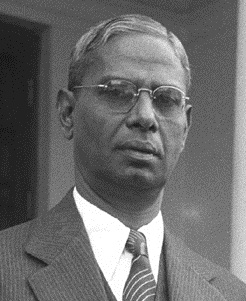 W
WSir Ramasamy Chetty Kandasamy Shanmukham Chetty KCIE was an Indian lawyer, economist and politician who served as independent India's first finance minister from 1947 to 1948. He also served as President of India's Central Legislative Assembly from 1933 to 1935 and Diwan of Cochin kingdom from 1935 to 1941.
 W
WPalaniappan Chidambaram is an Indian politician and former attorney who currently serves as Member of Parliament, Rajya Sabha. He recently served as the Chairman of the Parliamentary Standing Committee on Home Affairs (2017–18).
 W
WMorarji Ranchhodji Desai was an Indian independence activist and politician who served as the 4th Prime Minister of India between 1977 and 1979 leading the government formed by the Janata Party. During his long career in politics, he held many important posts in government such as Chief Minister of Bombay State, Home Minister, Finance Minister and 2nd Deputy Prime Minister of India.
 W
WSir Chintaman Dwarakanath Deshmukh, CIE, ICS was an Indian civil servant and the first Indian to be appointed as the Governor of the Reserve Bank of India in 1943 by the British Raj authorities. He subsequently served as the Finance Minister in the Union Cabinet (1950–1956). It was during this time that he also became a founding member of the Governing Body of NCAER, the National Council of Applied Economic Research in New Delhi, India's first independent economic policy institute established in 1956 at the behest of Prime Minister Jawaharlal Nehru. After resignation from Union Cabinet he worked as Chairman of UGC(1956–1961). He served as Vice-Chancellor of University of Delhi (1962–67). He was also President of Indian Statistical Institute from 1945 to 1964, Honorary Chairman of National Book Trust (1957–60). He founded India International Center in 1959 and served as Lifetime President of it. He was also chairman of Indian Institute of Public Administration.
 W
WIndira Priyadarshini Gandhi was an Indian politician and a central figure of the Indian National Congress. She was the 3rd prime minister of India and was also the first and, to date, only female prime minister of India. Gandhi was the daughter of Jawaharlal Nehru, the 1st prime minister of India. She served as prime minister from January 1966 to March 1977 and again from January 1980 until her assassination in October 1984, making her the second longest-serving Indian prime minister after her father.
 W
WRajiv Ratna Gandhi was an Indian politician who served as the sixth prime minister of India from 1984 to 1989. He took office after the 1984 assassination of his mother, Prime Minister Indira Gandhi, to become the youngest Indian prime minister at the age of 40.
 W
WPiyush Vedprakash Goyal is a politician and cabinet minister of the Government of India having portfolios such as Minister of Textiles, Minister of Commerce and Industry and Minister of Consumer Affairs, Food and Public Distribution. He was elevated to the Cabinet Minister position on 3 September 2017. Currently a Member of Parliament for Rajya Sabha from the state of Maharashtra, he is also the current Leader of the House in Rajya Sabha.
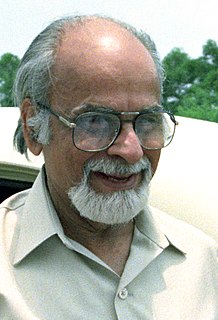 W
WInder Kumar Gujral was an Indian diplomat, politician and freedom activist who served as the 12th prime minister of India from April 1997 to March 1998.
 W
WArun Jaitley was an Indian politician and attorney. A member of the Bharatiya Janata Party, Jaitley served as the Minister of Finance and Corporate Affairs of the Government of India from 2014 to 2019. Jaitley previously held the cabinet portfolios of Finance, Defence, Corporate Affairs, Commerce and Industry, and Law and Justice in the Vajpayee government and Narendra Modi government.
 W
WNawabzada Liaquat Ali Khan, widely known as Quaid-e-Millat and Shaheed-e-Millat, was a Pakistani statesman, lawyer, political theorist, and one of the leading founding fathers of Pakistan. He became the first prime minister of Pakistan; he also held cabinet portfolio as the first foreign, defence, and the frontier regions minister from 1947 until his assassination in 1951. Prior to the partition, Khan briefly tenured as the first finance minister in the interim government led by Governor General Mountbatten.
 W
WTiruvellore Thattai Krishnamachari (1899–1974) was an Indian politician who served as Finance Minister from 1956 to 1958 and from 1964 to 1966. He was also a founding member of the first governing body of the National Council of Applied Economic Research (NCAER) in New Delhi, India's first independent economic policy institute established in 1956
 W
WJohn Matthai CIE (1886–1959) was an economist who served as India's first Railway Minister and subsequently as India's Finance Minister, taking office shortly after the presentation of India's first Budget, in 1948. He was born on January 10, 1886, as the son of Challiyal Thomas Matthai and Anna Thayyil to an Anglican Syrian Christian family. He graduated in economics from the University of Madras. He served as a Professor and Head in University of Madras from 1922 to 1925. He presented two Budgets as India's Finance Minister, but resigned following the 1950 Budget in protest against the increasing power of the Planning Commission and P. C. Mahalanobis. He was the first Chairman of the State Bank of India when it was set up in 1955. He was the founding President of the Governing Body of the National Council of Applied Economic Research (NCAER) in New Delhi, India's first independent economic policy institute established in 1956. He served as the Vice Chancellor of the University of Mumbai from 1955 till 1957 and then as the first Vice Chancellor of the University of Kerala from 1957 to 1959. His nephew, Verghese Kurien, is generally recognized as the architect of India's White Revolution. Dr. John Matthai Centre, Thrissur, located on the large plot of land donated by his family, is named in his honour. His wife, Achamma Matthai was an Indian social worker and a women's rights activist. The Government of India honoured her in 1954 with the award of Padma Shri, the fourth highest Indian civilian award, for her contributions to the society,
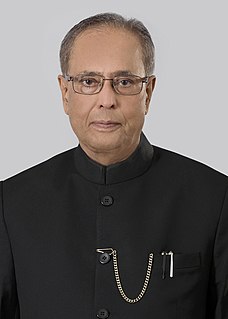 W
WPranab Kumar Mukherjee ; 11 December 1935 – 31 August 2020) was an Indian Statesman who served as the 13th president of India from 2012 until 2017. In a political career spanning five decades, Mukherjee was a senior leader in the Indian National Congress and occupied several ministerial portfolios in the Government of India. Prior to his election as President, Mukherjee was Union Finance Minister from 2009 to 2012. He was awarded India's highest civilian honour, the Bharat Ratna, in 2019, by his successor as President, Ram Nath Kovind.
 W
WJawaharlal Nehru was an Indian anti-colonial nationalist, secular humanist, social democrat and author who was a central figure in India during the middle third of the 20th century. Upon India's independence in 1947, he served as the country's prime minister for 17 years. Nehru promoted parliamentary democracy, secularism, and science and technology during the 1950s, powerfully influencing India's arc as a modern nation. In international affairs, he steered India clear of the two blocs of the Cold War. A well-regarded author, his books written in prison, such as Letters from a Father to His Daughter (1929), An Autobiography (1936), and The Discovery of India (1946), were read around the world.
 W
WChaudhary Charan Singh served as the 5th Prime Minister of India between 28 July 1979 and 14 January 1980. Historians and people alike frequently refer to him as the 'champion of India's peasants.'
 W
WMajor Jaswant Singh was an officer of the Indian Army and an Indian Cabinet Minister. He was one of the founding members of the Bharatiya Janata Party (BJP), and was one of India's longest serving parliamentarians, having been a member of the Lok Sabha or the Rajya Sabha almost continuously between 1980 and 2014. He was NDA's Vice-presidential candidate in the 2012 Indian vice presidential election. Singh was the only leader from Rajasthan who had the distinction of becoming the Minister Of External Affairs, Finance and Defense.
 W
WManmohan Singh is an Indian economist, academic, and politician who served as the 13th Prime Minister of India from 2004 to 2014. Currently, he is a Member of Parliament in the Rajya Sabha, representing the state of Rajasthan. A member of the Indian National Congress, Singh was the first Sikh Prime minister of India. Singh was also the first prime minister since Jawaharlal Nehru to be re-elected after completing a full five-year term.
 W
WVishwanath Pratap Singh, also known as V. P. Singh, was an Indian politician who was the 8th Prime Minister of India from 1989 to 1990 and the 41st Raja Bahadur of Manda. He is India's only prime minister to have been a former Zamindar.
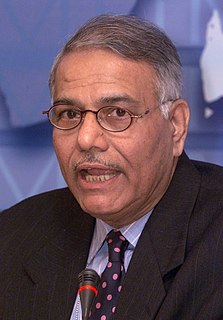 W
WYashwant Sinha is a former Indian administrator, politician and a former Minister of Finance. He was a senior leader of the Bharatiya Janata Party before he quit the party on 21 April 2018. He joined All India Trinamool Congress on 13 March 2021.
 W
WNirmala Sitharaman is an Indian economist and politician serving as the current Minister of Finance and Corporate Affairs of India. She is a member of the Rajya Sabha, upper house of the Indian Parliament, since 2014. Sitharaman formerly served as the Defence Minister of India, thereby becoming India's second female defence minister and also the second female finance minister after Indira Gandhi and first full-time female Finance Minister. She has served as the Minister of State for Finance and Corporate Affairs under the Ministry of Finance and the Minister for Commerce and Industry with independent charge. Prior to that, she served as a national spokesperson for the Bharatiya Janata Party.
 W
WChidambaram Subramaniam, was an Indian politician and independence activist. He served as Minister of Finance and Minister of Defence in the union cabinet. He later served as the Governor of Maharashtra. As the Minister for Food and Agriculture, he ushered the Indian Green Revolution, an era of self-sufficiency in food production along with M. S. Swaminathan, B. Sivaraman and Norman E. Borlaug. He was awarded Bharat Ratna, Indian's highest civilian award, in 1998, for his role in ushering Green Revolution.
 W
WNarayan Datt Tiwari was an Indian politician. He was formerly in the Praja Socialist Party and later joined the Indian National Congress.
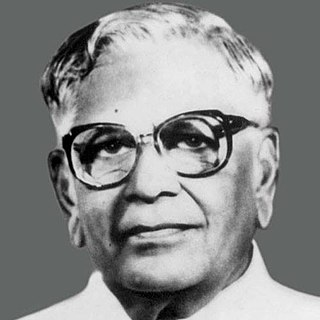 W
WRamaswamy Venkataraman was an Indian lawyer, Indian independence activist and politician who served as a Union Minister and as the eighth president of India. Venkataraman was born in Rajamadam village in Tanjore district, Madras Presidency. He studied law and practised in the Madras High Court and the Supreme Court of India. In his young age, he was an activist of the Indian independence movement and participated in the Quit India Movement. He was appointed as the member of the Constituent Assembly and the provisional cabinet. He was elected to the Lok Sabha four times and served as Union Finance Minister and Defence Minister. In 1984, he was elected as the seventh vice president of India and in 1987, he became the eighth President of India and served from 1987 to 1992. He also served as a State minister under K. Kamaraj and M. Bhaktavatsalam.